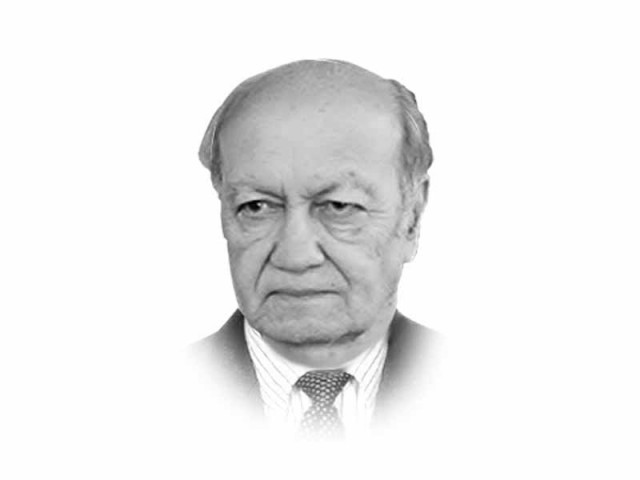Harmonising external and internal policies
We need more rational relationship with Afghanistan, Iran, Saudi, feasible only if we pursue policies strengthening us

The writer is a retired lieutenant general of the Pakistan Army and served as chairman of the Pakistan Ordnance Factories Board
Apart from Pakistan’s perceived Saudi tilt, Iran-Pakistan relations remain strained due to continuous sectarian conflict in which sectarian minorities are repeatedly targeted in Pakistan. The government’s inability to control the Lashkar-e-Jhangvi has created serious misgivings in our relationship. The policy, at one time, of using sectarian groups to target separatist national parties in Balochistan has backfired.
Pakistan will also have to stay clear of Saudi Arabia’s apprehensions regarding the interim nuclear agreement between the US and Iran. If it results in a permanent agreement, it will be a positive development — although not in the eyes of the Saudis, and their rivalry could drag Pakistan into it.
Pakistan’s support of the Afghan Taliban is viewed in Tehran with distrust. Iran is backing political groups that are dominated by Tajiks and Uzbeks of the former Northern Alliance and are opposed to the Afghan Taliban.
The coming months will place even higher demands on our government about policy choices, especially in dealings with Afghanistan, Iran and India, due to their direct impact on internal stability. Relations with Afghanistan are crucial at a time when our own militant groups are threatening to destabilise the state. Afghanistan and Pakistan need to cooperate closely to defeat the menace of militancy.
The question we confront today is: how can we nuance our policy towards Afghanistan in a way that does not strengthen the Afghan Taliban in the post-2014 scenario, and at the same time does not pitch them against us. Any military success of the Afghan Taliban, even if it were confined to the east and south of Afghanistan, would give a huge boost to Pakistani militant groups. Change in strategic direction for Pakistan will not be easy, as we have been supporting the Afghan Taliban for years. If Pakistan, however, is seen to continue in its tilt towards the Afghan Taliban, then it is very much possible that Afghanistan, India and Iran, along with Russia, could jointly oppose and create a very difficult situation for us.
At a time when Pakistan is committing its resources to go against militants in Fata, we have to ensure that Afghanistan cooperates and denies them sanctuary. The real challenge stems from the conflicting demands of balancing relations with Afghanistan while being able to contain the Afghan militant groups in Fata and dealing with our own militants. This would require that external and internal policies are closely coordinated — by no means an easy task. As there has been hardly any tangible progress between the Afghan Taliban and the US, or between Karzai and the Taliban leadership, Pakistan will have to take measures to prevent a fallout from across the borders.
peace deal that will allow the Afghan Taliban to return to powerWith the exception of Pakistan, all of Afghanistan’s neighbours, including the Central Asian states, are vehemently opposed to any . Broad-based hostility towards them requires Pakistan to exercise its relations with great finesse. The encouraging aspect, however, is that the Pakistani military and the political leadership are, perhaps, more realistic today and understand that there are dangers in being too close to the Taliban: even those who harbour no anti-Afghan Taliban feeling are cautious about embracing them.
Of late, Pakistan has revisited its Afghan policy and tried to reach out to other power centres in addition to the Pashtuns. Pakistan is also using its influence on the Afghan Taliban leadership to induce them to talks that could lead to a power-sharing agreement and a peaceful transition. Of course, Pakistan’s influence with the Taliban is limited and it is not clear, as mentioned earlier, if they, the US and Karzai are serious about negotiations. To achieve any meaningful results, the US and India should similarly engage the Northern Alliance in showing greater flexibility in accommodating the genuine interests of Pashtuns. Even if attempts of the US and neighbouring countries fail to stabilise Afghanistan, it would still be in the mutual interest of India and Pakistan to cooperate and play a constructive role.
At a minimum, Pakistan and Afghanistan need a better bargaining position with the Afghan Taliban and for that we need a much better understanding of their demands and our own bottom line. By getting the Afghan Taliban issue under better control, both countries also serve their interests in strengthening their position vis-a-vis the United States, in being able to push back on politically sensitive issues such as drone attacks where US pressures can create more problems than they mean to solve. We need to cease thinking of the Afghan Taliban in Afghanistan, or elements of that movement, as instruments of Pakistan’s ‘strategic depth’ in Afghanistan and recognise that — as matters stand — Pakistan’s own militants represent a major threat to political stability within our own borders.
In sum, Pakistan needs a more rational relationship with Afghanistan, Iran and Saudi Arabia and that is only feasible if we pursue internal and external policies that strengthen us domestically and improve our situation regionally.
Published in The Express Tribune, March 5th, 2014.
Like Opinion & Editorial on Facebook, follow @ETOpEd on Twitter to receive all updates on all our daily pieces.















COMMENTS
Comments are moderated and generally will be posted if they are on-topic and not abusive.
For more information, please see our Comments FAQ